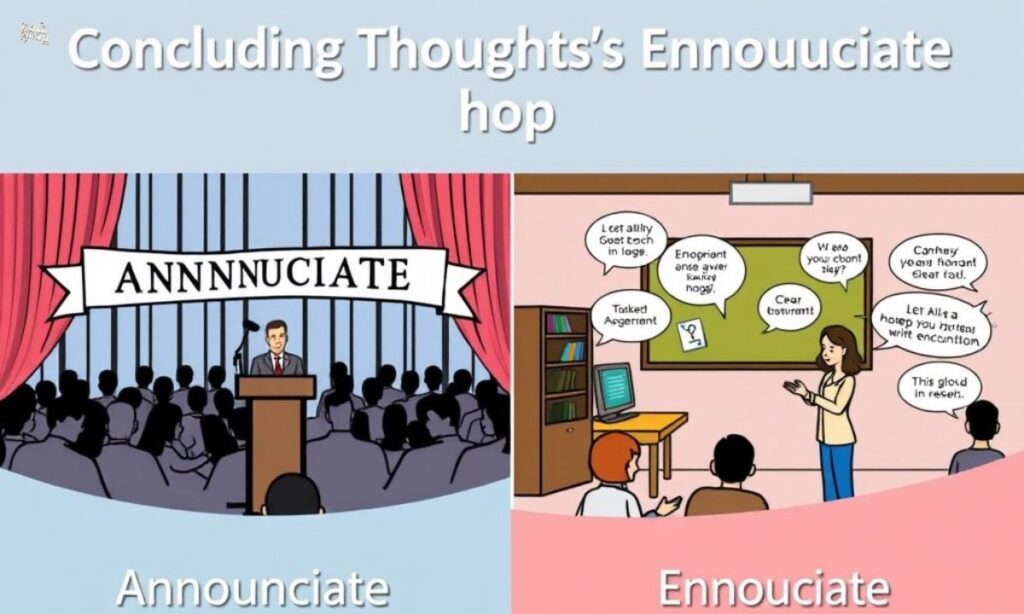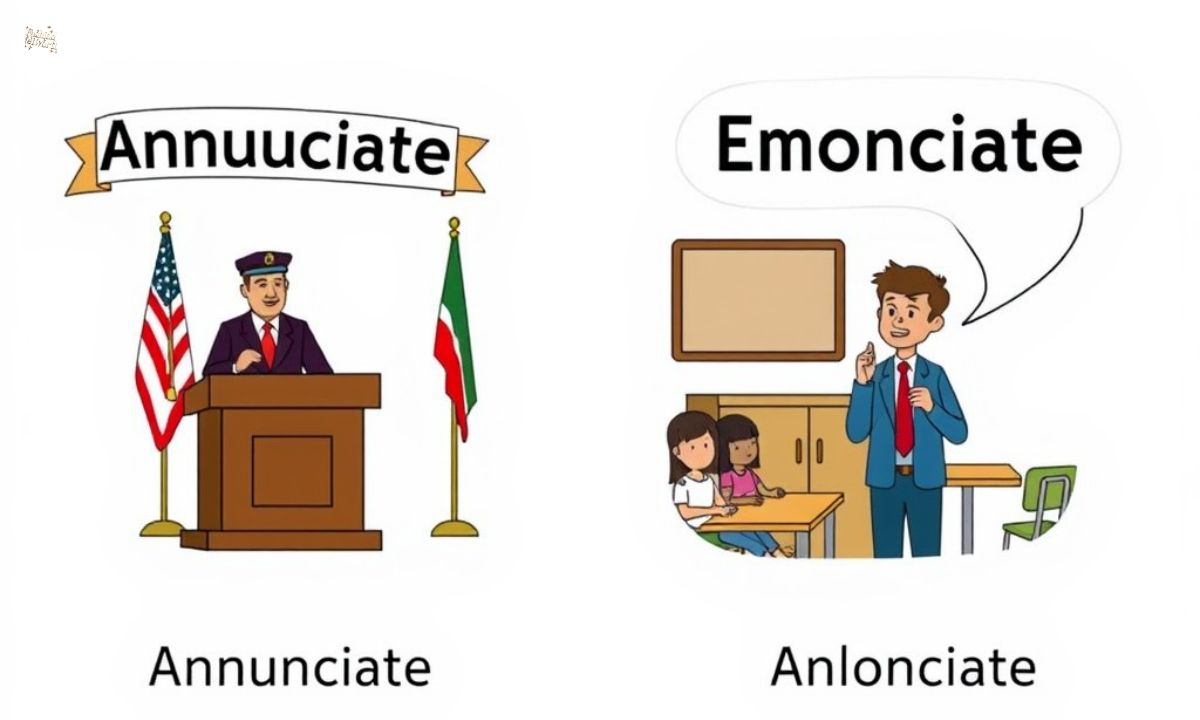When it comes to communication, clarity is key. Understanding the difference between “annunciate” and “enunciate” can elevate your speaking and writing. These two words sound alike, but they serve distinct purposes in the realm of language.
The Confusion Conundrum
People often mix up annunciate and enunciate because they sound similar and both relate to speaking. However, they focus on different aspects of communication. While they might overlap in casual use, knowing their meanings can help you communicate more effectively.
The key distinction is that annunciate relates to making formal announcements, while enunciate focuses on the clarity and precision of how you speak. Understanding this difference ensures your message is conveyed clearly and appropriately.
Exploring the Origins of Annunciate and Enunciate
Understanding the origins of annunciate and enunciate sheds light on why these words have different meanings. Their roots come from two distinct Latin terms that shaped their current uses. Knowing their etymology helps explain their differences more clearly.
Both words stem from Latin, with annunciate coming from annuntiare (to announce), and enunciate from enuntiare (to declare or pronounce). Despite the similarity in their sound, their historical paths diverged, leading them to have separate uses in modern English.
Historical Context and Etymology
The word annunciate originally came from religious and formal contexts. It was often used in the context of important proclamations or declarations. The Annunciation in Christian tradition refers to the angel announcing the birth of Christ, an event that embodies formal announcement.
On the other hand, enunciate was associated more with clarity in pronunciation and speech delivery. The focus of enunciate was on articulating words clearly, ensuring speech clarity for the listener. This made it more applicable in day-to-day conversations.
The Evolution of Usage Over Time
Over the centuries, the words annunciate and enunciate evolved into distinct terms. Annunciate has become more associated with formal settings, such as public speaking or ceremonial announcements. Meanwhile, enunciate became widely used in speech instruction and effective communication.
The change in usage highlights the shift from proclamation to clarity. In modern communication, enunciate is often used to emphasize speech accuracy in everyday conversations, while annunciate remains linked to important declarations.
The Definition of Annunciate: More Than Just an Announcement

Annunciate means to announce something formally or officially. It’s more than just stating information—it’s about making a declaration that carries weight. When you annunciate, you are broadcasting important news or details with authority.
For example, a public figure might annunciate changes to a policy, or a leader might annunciate a key decision that affects many people. This process of formal proclamation adds gravity to the message being delivered.
Annunciate Meaning
The meaning of annunciate involves a proclamation or a formal announcement. When someone annunciates, they are making a clear and important declaration, often in front of an audience or group. This term is usually reserved for significant, official messages.
A common setting where annunciate is used could be a government official announcing a new policy or a company CEO announcing a merger. The speech has an authoritative tone, and the purpose is to inform the public.
Examples of Annunciation Used in a Sentence
- The principal annunciated the new school rules during the morning assembly.
- The priest annunciated the message of peace and goodwill during the service.
- At the press conference, the mayor annunciated the city’s new environmental policy.
These examples show how annunciate is used in formal, official contexts where important information is being made public. It highlights the speech delivery and projection of significant declarations.
Read This Blog: Amouranth Age: How Old is the Twitch Star in 2024?
Understanding Enunciate: The Art of Clear Speech
Enunciate is a term used to describe clear and distinct speech. It refers to the act of pronouncing words in a manner that ensures the listener understands each sound and syllable. When you enunciate, you are focused on pronunciation and articulation.
Enunciating properly is important in various settings, from public speaking to casual conversation. It ensures your message is not lost in a jumble of unclear sounds, helping you communicate with precision.
What Does Enunciation Mean?
Enunciation is about speaking clearly. It involves distinct pronunciation and diction, ensuring every word is understood. Good enunciation means making every syllable audible, giving it attention to ensure the audience grasps the meaning.
For example, a teacher might ask a student to enunciate their words more clearly to improve speech clarity and pronunciation. Enunciation is crucial for effective speaking, whether in public or private communication.
The Importance of Pronunciation and Diction
Clear pronunciation and proper diction are essential components of enunciation. When you enunciate properly, you ensure your words are spoken distinctly, without slurring or mumbling. This is crucial for effective communication, as listeners rely on the articulation of words to understand your message.
In public speaking, for instance, clear speech helps maintain the audience’s attention and ensures they can follow along with your argument or message. Without good enunciation, even the best ideas can be lost in translation.
How to Pronounce Enunciate
To pronounce enunciate correctly, break it down into syllables: e-NUN-ci-ate. Emphasize the second syllable, and ensure each part is clearly spoken. This will help you pronounce clearly, making sure the listener catches each syllable and understands your message.
It’s essential to practice proper pronunciation of challenging words, especially when speaking in professional settings or engaging in public speaking. Enunciation can significantly enhance the clarity in communication.
Enunciate in Practice

In practice, enunciating helps prevent misunderstandings in communication. Whether you’re speaking in a crowded room or delivering a speech, clear articulation ensures that your message reaches the listener with precision. The more you enunciate, the more your speech will become understandable.
For example, a politician speaking to a large crowd needs to enunciate to ensure their speech resonates with everyone. This prevents the audience from missing key points, making sure the message is clear and impactful.
Enunciation in Professional Settings
Good enunciation is a key part of effective speaking in professional environments. For instance, a lawyer presenting a case must enunciate their arguments clearly to ensure the jury understands their point of view. Similarly, a teacher needs to enunciate instructions so students grasp the lesson.
In any public speaking situation, whether it’s a meeting, presentation, or lecture, enunciation ensures your message is communicated with precision and clarity.
Using “Enunciation” in a Sentence the Right Way
- The actor’s enunciation of the script made the character’s emotions clear.
- The coach emphasized the importance of enunciation in delivering a powerful speech.
- The debate coach helped the students improve their enunciation for the upcoming competition.
These sentences show how enunciation improves speech clarity and pronunciation. The emphasis is on making sure each word is distinctly articulated.
Enunciation as a Verb
The verb form of enunciation is enunciate, which means to speak clearly. For example, “Please enunciate your words for the audience to understand.” It’s an important part of ensuring speech accuracy in public speaking.
Encouraging someone to enunciate can help them focus on clarity in communication, especially when they need to present information or speak in a professional setting.
Read This Blog: Is It Correct to Say “Good Luck with Your Future Endeavors”?
Examples of Annunciate and Enunciate in Sentences
- The mayor annunciated the new city policy during the press conference.
- The teacher instructed the students to enunciate each word in their presentations clearly.
In these examples, annunciate is used for formal declarations, while enunciate focuses on clarity in speech.
Annunciate in Action: Context and Clarity
When you annunciate, you make a formal statement. For example, a president annunciating a new law demonstrates the weight and importance of the message. The speech delivery is direct and impactful.
In contrast, enunciate refers to ensuring your words are clear. A presenter who enunciates each syllable will make their speech much easier to understand, enhancing communication skills.
Enunciate in Everyday Speech: The Key to Clarity
In everyday conversations, enunciating helps others understand you clearly. Whether speaking to a friend or a colleague, enunciation ensures that your words are distinctly understood. This is especially important in noisy environments or when discussing complex topics.
For example, when you’re ordering coffee, enunciating your words helps the barista get your order right, making the exchange efficient and smooth.
Concluding Thoughts on Annunciate vs Enunciate

Understanding when to use annunciate and enunciate is crucial for effective communication. Annunciate is used for formal proclamations, while enunciate focuses on clarity in speech. Knowing the difference can elevate your public speaking and everyday interactions.
Annunciation vs. Enunciation: Now You Know
Now that you know the difference, you can confidently use annunciate when making formal declarations and enunciate when focusing on speech clarity. Both skills are vital for effective communication and will help you express yourself more precisely.
Related Concepts
When talking about enunciation, other concepts like pronunciation, articulation, and diction come to mind. These terms all focus on how words are spoken and understood. Mastering these skills can improve oral expression and communication skills in any setting.
Synonyms for Enunciation
Some synonyms for enunciation include articulation, pronunciation, diction, and vocalization. Each of these terms emphasizes a slightly different aspect of speaking clearly but all contribute to effective speech clarity.
Frequently Asked Questions
What is the difference between enunciate and pronounce?
Enunciate refers to speaking clearly and distinctly, while pronounce focuses on the correct way of saying individual words.
What does it mean to annunciate your words?
To annunciate your words means to make a formal declaration or announcement. It’s not about clarity in speech but making an important statement.
What is the meaning of annunciate and pronunciation?
Annunciate means to formally announce, while pronunciation is about how individual words are spoken correctly.
What is an example of enunciation?
An actor who speaks each word clearly and distinctly in a play is practicing enunciation.
What is the difference between annunciate and enunciate?
Annunciate is for formal proclamations, while enunciate focuses on clear speech.
What is annunciation in speech?
Annunciation in speech refers to a formal declaration or announcement, often with authority or significance.
Summary
In this guide, we explored the difference between annunciate and enunciate. Annunciate is used for making formal announcements, while enunciate emphasizes speech clarity. Understanding these terms ensures effective communication in both professional and casual settings.

Hayyat is a talented content writer and digital marketer with expertise in SEO, social media management, and online marketing. She excels at creating impactful, data-driven content to help businesses connect with their target audience and achieve measurable outcomes.














